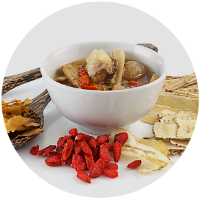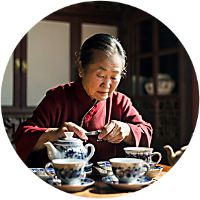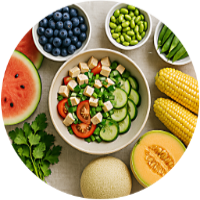Eating for Autumn:
Nourishing Yin and Preparing for the Cold
In traditional Chinese medicine (TCM), autumn is the season of Metal—linked to the Lungs and Large Intestine, as well as the emotions of grief and letting go. The Yang energy of summer begins to wane, and the world turns inward. Dryness becomes a major environmental influence during this time, affecting the skin, sinuses, throat, and lungs. Our diet in autumn should reflect this shift, helping the body retain moisture, strengthen immunity, and ease the transition into colder weather.
Dryness in TCM is considered an external pathogenic factor. It can show up as dry cough, chapped lips, constipation, or itchy skin. To counteract it, autumn calls for foods that are moistening but not heavy, warming but not hot. The idea is to protect the Yin—the cooling, nourishing aspect of the body that can easily become depleted in dry or windy weather.
 Pears are one of the classic foods for autumn. Lightly steamed or simmered with a few goji berries or a bit of honey, they soothe the lungs and moisten dryness. Other Yin-Nourishing foods include white wood ear fungus, lotus root, sesame seeds, almonds, and honey. These ingredients can be incorporated into porridges, soups, or simple cooked dishes that are both hydrating and easy to digest.
Pears are one of the classic foods for autumn. Lightly steamed or simmered with a few goji berries or a bit of honey, they soothe the lungs and moisten dryness. Other Yin-Nourishing foods include white wood ear fungus, lotus root, sesame seeds, almonds, and honey. These ingredients can be incorporated into porridges, soups, or simple cooked dishes that are both hydrating and easy to digest.
As in every season, TCM encourages avoiding extremes. Cold and raw foods are still discouraged, especially as the weather cools and the digestive system becomes more vulnerable. The Spleen Qi—which governs digestion—prefers warmth. Meals should be mostly cooked, served warm, and eaten in a calm environment. This supports not only physical digestion but also the emotional process of letting go, which is central to autumn's energy.
This is also the time to reduce pungent and spicy foods, which can dry out the body and irritate the lungs. A little ginger or scallion is fine for promoting circulation and warding off early colds, but excessive spice can upset the delicate moisture balance needed in autumn.
Soups, congee, and steamed dishes take center stage during this season. A simple congee with black sesame and rice, or a soup with lily bulb and white fungus, can go a long way in supporting both the lungs and intestines. These foods nourish yin, soothe dryness, and help keep the skin, throat, and bowels comfortable.
Emotionally, autumn invites stillness and reflection. The diet can support this by being grounding, rhythmic, and simple. In the spirit of Yangsheng (养生), we aim not just to avoid illness, but to attune ourselves to the rhythm of nature—eating in harmony with what the season offers, and preparing the body gently for the months ahead.
Vocabulary Guide
qi (气) – vital energy, essential to all body functions
spleen qi (脾气 píqì) – digestive energy that transforms and transports food
yin (阴) – the cooling, nourishing, and moistening aspect of the body
yangsheng (养生) – the practice of nourishing life through daily lifestyle choices







